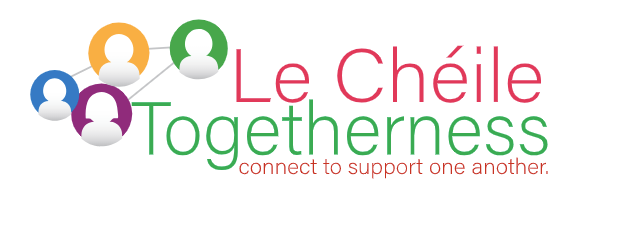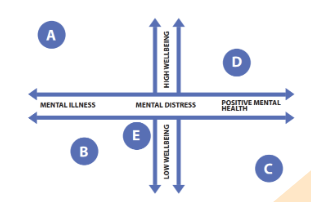There are two very important things to know about mental health.
The first is that everyone has a mental health. We often only talk about mental health in terms of ‘people struggling with their mental health’ or ‘mental illness’, but even those of us who do not have any mental health problems still have ‘a mental health’, just like we all have a physical health, even though we are not all physically sick.
The second thing to remember is that mental health exists on a scale, and there are two important things to know about that scale – anyone can be anywhere on that scale at a given time, and everyone moves up and down that scale through their lives.
Even if you never have a mental illness in your life, there still might be times when you struggle with your mental health – this could be because something is happening in your life that is hard to deal with. Similarly, if you do have a mental illness, that doesn’t mean you will always be at the one end of the scale – mental illness are often something that you can recover from, but even while having a mental illness, there are times when it can be really bad, and times when it’s not so bad.
Looking Back on Mental Health Week
Throughout this week, we have talked about some of the different things that can affect our mental health – from how we think about our bodies, how we take care of ourselves, how using substances or engaging in some activities excessively can affect our mental health, and how engaging with other people can be helpful to our mental health. We hope that this has made you realise that mental health is an integral part of all our lives, and that we need to be doing things every day to help mind our mental health. We also hope that you realise the need to take care of all the parts of your life – physical health, relationship heal, sexual health etc, as well as mental health, in order to have a good level of wellbeing.
Wellbeing and mental health are two concepts that are related, and overlap, but are different in multiple, complex ways. Essentially, mental health is a part of wellbeing, but wellbeing encompasses other factors such as outlined above. The figure below can help you to check in your wellbeing and mental health, which we all should be doing on a regular basis.
How does the figure work?
We have placed some letters on the figure. Each letter is a pretend person, who has rated their overall wellbeing and mental illness according to the two lines that are intersecting.
Person A experiences a severe and enduring mental illness, but also high levels of wellbeing. They may be managing their mental health condition effectively and receiving the appropriate treatment, and otherwise leading a happy and fulfilling life.
Person B experiences a common mental health condition but is also experiencing low wellbeing. They may be failing to receive effective treatment, affecting their happiness and causing them added stress. Similarly, they could be receiving effective treatment, but other factors might be causing them to experience low wellbeing.
Person C experiences positive mental health, but low wellbeing. They are mentally healthy in that they do not have a diagnosable mental health condition or exhibit symptoms of mental distress but may also experience low levels of happiness or satisfaction with their life.
Person D experiences positive mental health and high levels of wellbeing. They do not have a mental health condition, are not exhibiting symptoms of mental distress, and are generally happy and satisfied with their life.
Person E is exhibiting some symptoms of mental distress. It is not clear that this meets the threshold for a clinical diagnosis of a mental health condition, but they are reporting that they do not consider their mental health to be positive. This is coinciding with low wellbeing, indicating they are also experiencing low levels of happiness and satisfaction
Where would you place yourself on this map right now? Where would you have placed yourself last week, or last year? Remember that where you might place yourself can change based on lots of different factors, like those outlined in the examples above. What is important to remember is that if you are finding yourself consistently in the areas of low wellbeing or high mental distress, it’s important that you reach out and ask for help.
There’s lots more information and support available if you need it.
Mental health
- If you feel like you’re struggling in any way, contact your college counselling services to arrange an appointment to talk to someone
- For useful resources on your mental health go to the ‘Mind Your Mental Health’ on usi.ie
- HSE’s yourmentalhealth.ie has specific advice on how to mind your mental health during the coronavirus outbreak
- If you feel you are at risk of suicide during the pandemic, call 999/112 or present to the nearest Accident and Emergency Department



Recent Comments